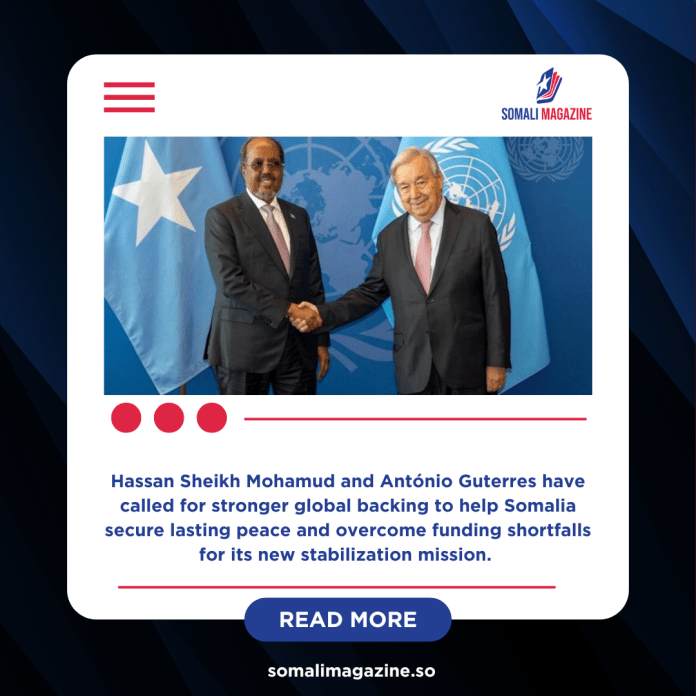Facebook Twitter (X) Instagram Somali Magazine - People's Magazine
Somali President Hassan Sheikh Mohamud held a meeting with United Nations Secretary-General António Guterres on Friday during the 80th UN General Assembly in New York. The two leaders used the occasion to reaffirm their shared commitment to strengthening cooperation on peace, security, and development, not only in Somalia but also across the wider Horn of Africa.
Their discussions highlighted the urgent need for joint strategies that can address Somalia’s pressing challenges while also laying a foundation for long-term stability. Central to the talks was the issue of security, as Somalia continues to face threats from the militant group al-Shabaab. Both leaders agreed that tackling these challenges requires not just national determination but also consistent international support.
President Mohamud emphasized Somalia’s progress in reclaiming areas from extremist control and noted that the country is determined to take full responsibility for its security. However, he stressed that Somalia cannot walk this path alone. He called for stronger partnerships and sustained support from global institutions and regional allies to ensure that the gains achieved so far are not reversed.
Secretary-General Guterres welcomed Somalia’s determination to build lasting peace and stability but underlined that progress can only be maintained if the international community continues to stand by Somalia. He pointed out that while military advances are important, peace will also require attention to governance, humanitarian needs, and sustainable development. The meeting reflected a shared recognition that Somalia’s journey toward stability involves more than security—it also demands education, economic growth, and resilience against the impact of climate change and recurring droughts.
The timing of the meeting was especially significant as Somalia and the African Union are appealing for urgent donor support to fund the new African Union Support and Stabilization Mission in Somalia (AUSSOM). The mission, which officially replaced the African Union Transition Mission in Somalia (ATMIS) earlier this year, is tasked with guiding Somalia toward full ownership of its security responsibilities. Unlike its predecessor, AUSSOM is designed to focus not only on frontline military support but also on building local institutions that can sustain peace once foreign troops withdraw.
Yet, the mission faces a serious funding gap. According to the African Union, AUSSOM will need around $196 million in 2025 to carry out its mandate effectively. While the AU has already doubled its own Peace Fund contribution to $20 million, officials warn that this amount is far from enough to keep operations running. Without predictable and sustainable financing, there is a risk that the fragile progress made in Somalia could be undone.
President Mohamud and Secretary-General Guterres both acknowledged the risks posed by this shortfall. They urged the international community to step up its support and to treat Somalia’s stability as a matter of shared global interest. If Somalia falters, they noted, the consequences will be felt not only in the Horn of Africa but across international waters and beyond.
Somalia’s leaders believe that this is a crucial turning point. With continued backing, the country has a real opportunity to take charge of its security and focus more on development. But without sustained investment in both security and resilience, the cycles of violence and humanitarian crisis could resurface. The appeal made in New York reflects a broader message: that peace in Somalia cannot be built overnight, and it cannot be built alone. It will require patience, commitment, and most importantly, predictable international solidarity.

